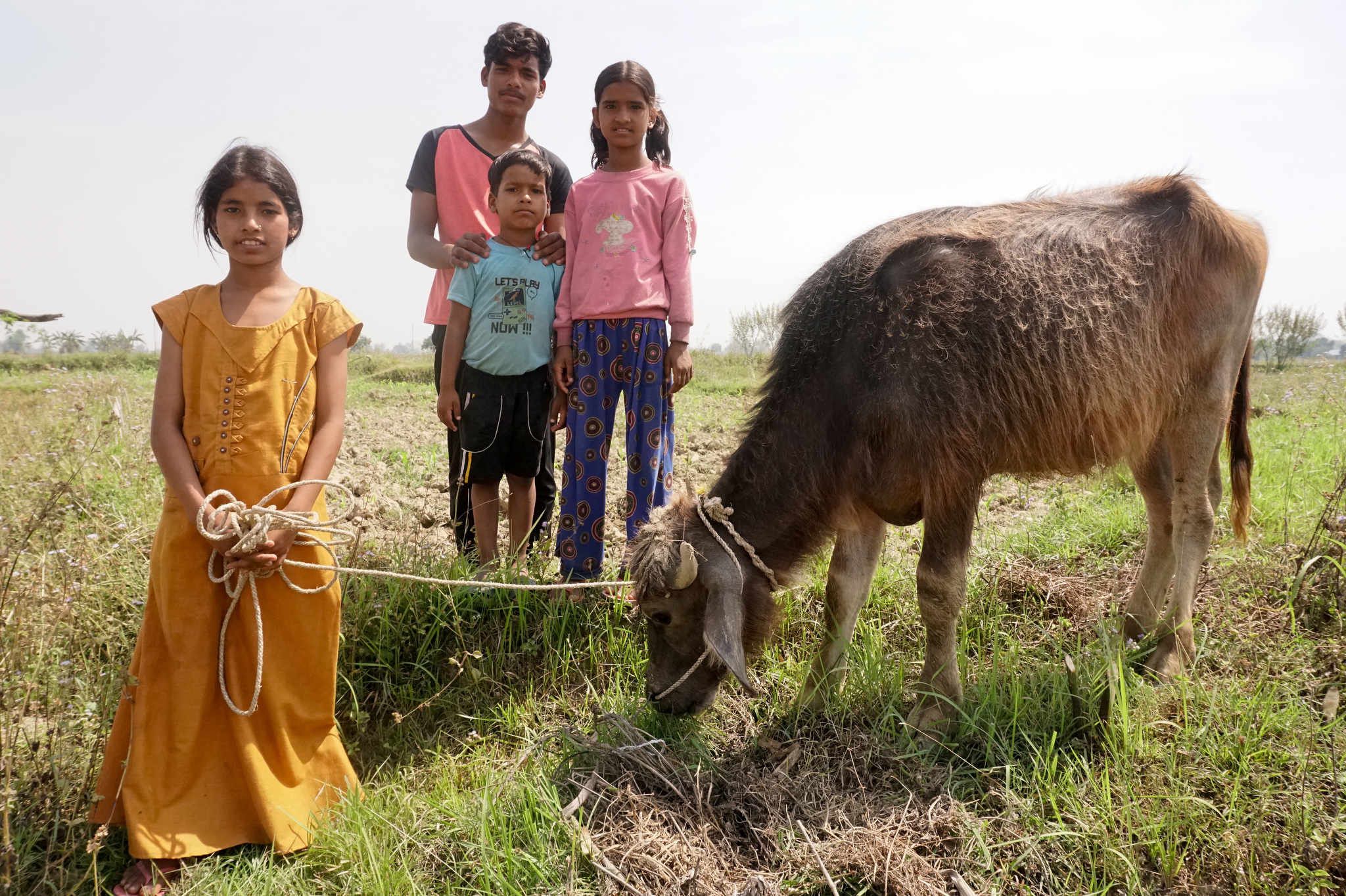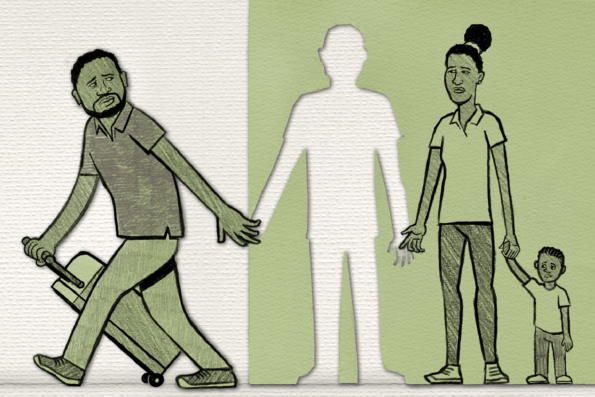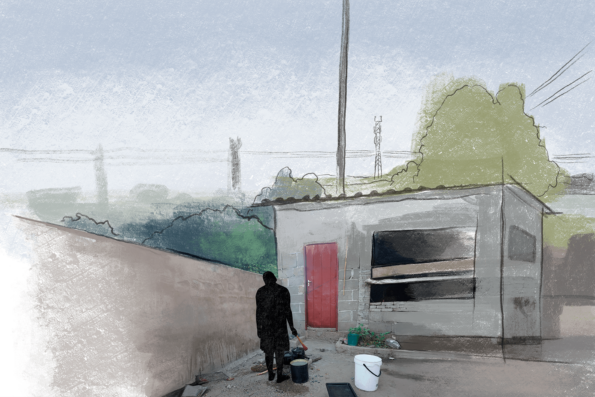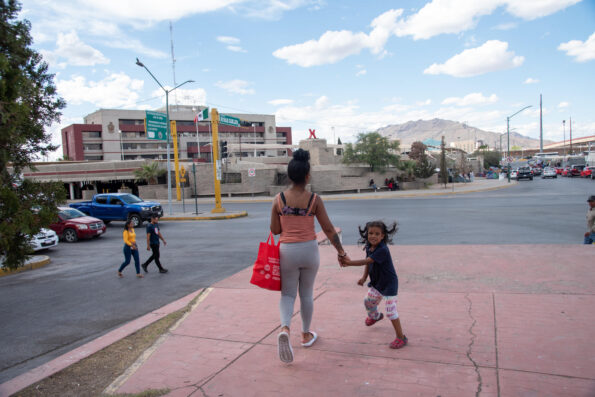
Yam Kumari Kandel, GPJ Nepal
From left, Durga Jaisi, 12, Prakash Jaisi, 18, Rajendra Ghodasaini, 6, and Bhawana Jaisi, 11, stand for a portrait on their family land in Thakurbaba municipality.
BARDIYA, NEPAL — It was the Nepali New Year and the sun was bright and strong. The fields appeared desolate, except the luxuriantly growing green corn. After fetching water from a nearby hand pump, Prakash Jaisi, 18, walked back to the home he shares with his three siblings in Bardiya district’s Banbir area, more than 500 kilometers (over 300 miles) from Kathmandu, the capital of Nepal. As it was a public holiday in the country, all his friends had gone out to have fun. “I’d like to spend time with my friends, but I don’t have the time,” he says. Instead, Jaisi did the dishes and completed all the pending housework. Even though his exams are approaching, he has not been able to prepare. There is no time.
Jaisi’s parents left for India in December 2021, intending to work in the neighboring country to repay their house loan of 800,000 Nepali rupees (6,089 United States dollars). As they left, the responsibility of the house and his siblings was handed over to Jaisi, who is the oldest.
Just like Jaisi’s parents, 2.2 million people belonging to 1.5 million Nepali households are absent and living abroad. Of these, over 80% are men, according to the 2021 census on population and housing. The reasons for migration include the desire for a better future and financial status.



Most of these Nepali migrant workers leave without their families, creating a large group of children — like Jaisi and his siblings — who are left behind, says Ganesh Gurung, a sociologist and labor migration expert. According to the 2021 census, 77.9% of the country’s 9.9 million children live with both parents and 17.1% live with their mothers only. The census also found that 1% of households, more than 75,000, are headed by someone age 19 or younger. More than 7,300 households are led by a child between the age of 10 and 14.
While there are no official statistics on the number of children who are left behind because of migration, psychologists in the country have started to identify patterns of behavior among the wards of migrant families, which points to a simmering mental health crisis in the country. Kathmandu-based child psychologist Ganga Pathak says she can clearly see a future in which the country will be grappling with the “mental health challenges of all these children who will be adults” in a few years.
In his house, Jaisi cooks, washes clothes, cleans the house and purchases food. His younger sisters, Durga Jaisi, 12, and Bhawana Jaisi, 11, take turns, putting their buffalo out to graze and cutting the grass. Together, they all take care of the youngest, 6-year-old Rajendra Ghodasaini.
Jaisi says that household responsibilities and his parents’ absence keep him awake almost every night. “My mind doesn’t work; all I feel is anger,” he says.
Nepal is a major labor-exporting country and has a heavily remittance-dependent economy. Migrant remittances have not only contributed to increasing household income and the national gross domestic product, according to a 2020 International Monetary Fund study, but have also played a big role in reducing poverty.





The positive impact of people going abroad is well documented in the context of Nepal’s economy, but only recently has the conversation begun on its other possible repercussions, particularly with respect to family dynamics.
A 2019 report by the Centre for Mental Health and Counselling-Nepal found that children who are left behind were more vulnerable to psychological problems. Out of 137 children and adolescents whose parents had migrated abroad, 48.2% had anxiety, 18.3% lived with depression and 8% had suicidal thoughts, according to the report.
In a 2022 study, the National Human Rights Commission also referred to the negative impact of separation from primary parents on children’s cognitive development.
Jaisi, Bhawana and Durga all talk about the stress and worry that they live with every day. Their parents send 30,000 rupees (228 dollars) from India every month to pay off the loan and cover household expenses. The siblings use 5,000 rupees (38 dollars) for food and other expenses, and mostly consume lentils and rice that they grow themselves. For the last three months, their parents couldn’t send money and lenders seeking repayment have already started visiting their home daily.
Looking at her parents’ photograph on her mobile phone, Durga says, “If they were at home, we would all be together. They only left because of the debt.” Bhawana says she feels sad because she is unable to sleep with her mother and eat food prepared by her.



Children who are separated from their parents become angry and irritable, and perform poorly at school, says Indira Pradhan, a psychologist and clinical coordinator at the Transcultural Psychosocial Organization Nepal.
To lessen mental health issues among teenagers, TPO Nepal conducts a sports game program in the Madhuwan municipality of Bardiya district. Children learn how to set life goals, recognize and solve problems, understand and manage emotions, handle failure, and avoid harmful behavior by participating in weekly football, martial arts and dance activities. TPO Nepal was established in 2005 to promote the psychosocial well-being and mental health of children and families in conflict and other vulnerable communities.
Not far away from the Jaisis lives 8-year-old Malika Chaudhary with her two siblings, Aviskar Chaudhary, 12, and Dhiraj Chaudhary, 18, and their grandmother, Lakshmi Devi Chaudhary. Both their parents work abroad. The grandmother says the children quarrel with each other frequently, making it difficult for her to take care of them. They cry all the time and ask whether their mother really loves them at all, she adds.
“Children can’t express what’s on their minds,” Pathak says, “and when what’s on their minds is suppressed, it all gets stuck as a knot.”
The observations of psychologists such as Pathak and Pradhan are corroborated by those working with children in schools, who say that they see a visible change in the educational and psychosocial level of children in the absence of parents.



Hari Prasad Gauli, vice principal of Kisan Secondary School in Bankatti, a Bardiya locality, says children who arrive at school with their parents appear happy and arrive on time, whereas those without their parents often arrive late and are gloomy. He says these children do not do their homework, do not bring books and notebooks to school, become irritated, and remain isolated from other children in the classroom. Research on this subject has also identified these behavioral patterns.
Samir Kumari Adhikari, joint spokesperson at the Ministry of Health and Population, says that the ministry is aware of issues relating to the mental health of children whose parents are abroad. He says the government doesn’t have any specific program to address the problem, but has organized general mental health programs nationwide. “If any of the kids need mental health treatment service, then they can get those services from the government.”
There is an eerie quiet inside Jaisi’s small, tin-roofed house. The mention of his mother makes him tear up. “We could study better if our mother was at home. We could get to school on time. Other friends arrive on time for school. We are always late,” he says.
Pathak believes that this unnoticed crisis is so worrying that a law should be enacted to prevent parents of very young children from leaving them behind. If children’s mental health is to be improved, she says, the community should be made aware of the importance of child psychology.
“If a child cries a lot, he or she is labeled as a crybaby, but people do not know that it is a sign.”
Yam Kumari Kandel is a Global Press Journal reporter based in Nepal.
TRANSLATION NOTE
Sunil Pokhrel, GPJ, translated this article from Nepali.






